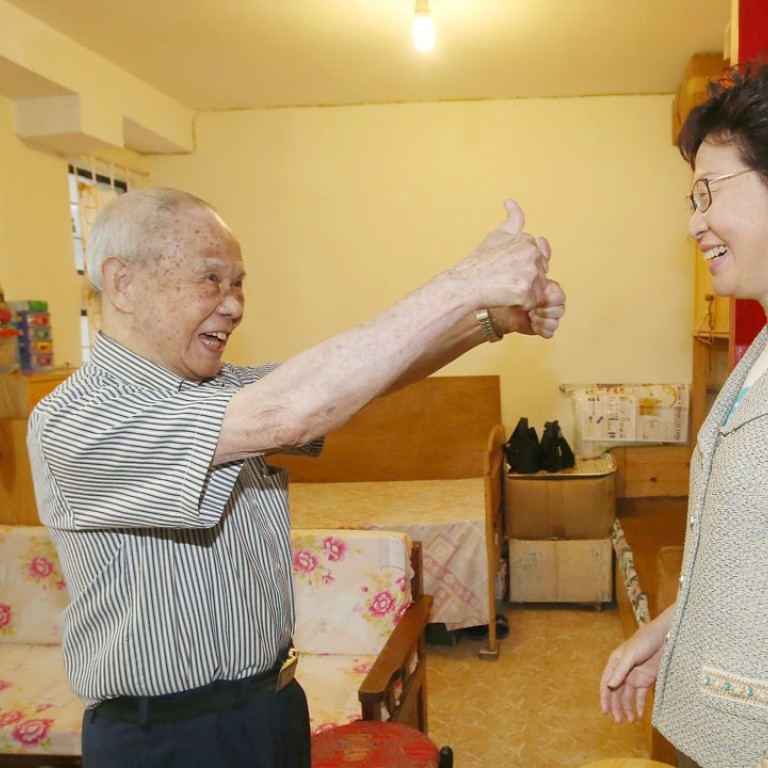
Letters to the Editor, February 17, 2018
Can Lam help elderly facing MTR hurdles?
I applaud the chief executive’s often-stated personal concern and policy priority for the living conditions and welfare of average citizens, especially the aged, invalid and poor. I trust that she speaks from her heart.
I would just ask that she put her personal political weight behind something that should be relatively straightforward and really help those facing a basic access problem daily.
Try walking from the Tai Wo Hau MTR station (exit B) to Tai Wo Hau Estate across Castle Peak Road without using the lift. Sure, there is a tiny lift accessible from the MTR concourse. But it is so tiny and, if it is working, the queues are so discouraging. Just walk; then you would know what those you care about have to go through daily.
Similar exercises could be repeated at Shau Kei Wan MTR station exit A to catch a bus; Kwun Tong Road off a KMB bus to MTR Kowloon Bay exit B; Diamond Hill exit B Lung Cheung Road at just about 7am – to see the workers serving the food kiosks in the MTR concourses physically carrying bulky containers up the stairs. Notice how none of these places are around Central or Wan Chai?
Yes, one could hide behind the explanation that this is the responsibility of the MTR Corporation. But I worked in Hong Kong for over a decade and I know how leaders can hide behind resource rules and so on.
But someone who really cared would cut through the mumbo jumbo and divert all financial resources (Financial Secretary Paul Chan Mo-po, please note for your budget consultation exercise) to overcome all obstacles.
Leadership, and compassionate leadership, is what it takes. The seniors, invalids and the infirm cannot afford to wait. Show us you really do care, Mrs Lam.
Raymond Chan, San Po Kong
China bishops deal requires blind faith
One wonders through what prism Plate has perceived the Communist Party’s purposeful confiscation of Chinese citizens’ already limited freedom of expression and religious practice.
What conclusions are we to draw from the destruction of Christian churches and President Xi Jinping’s relentless criticism of religion not in service to the state?
The party under Xi has stated that it has taken a lesson from the Soviet experience, and that the Chinese Communist Party would never repeat the liberalising mistakes of Mikhail Gorbachev.
How, then, are we to interpret Plate’s contention that “a new procedure”, under which bishops of the Catholic Church “could be jointly nominated”, would “empower both the communist state and the Catholic Church”, thus enabling the party and the Church to live “in harmonious coexistence”?
Plate himself provides the key when he observes that “the world is in the consequential process of making room for China”.
The “wisdom” of compromise he extols is nothing more than accommodation, in the vain hope that its party will grow more tolerant of independent thought or worship not under control of and in service to the state.
David Cooke, Maryland, US
Keeping right on new bridge not so simple
What Mr Yick fundamentally fails to comprehend is that these drivers hire cars designed to be driven on the right, where the golden rule of the driver being closest to the road centre is easily managed.
Driving a left-hand car on the right, or vice versa, where the driving position places you kerbside, leads to confusion, or worse.
Mark Peaker, The Peak
Wigan is far from ‘declining backwater’
Wigan has moved on significantly since the industries of cotton and coal helped establish it as a burgeoning town in the industrial revolution.
Wigan is now a forward-thinking, business-friendly modern borough, which plays a leading role in Greater Manchester’s success. We have the biggest food manufacturing plant in Europe thanks to Heinz, 500 growing digital businesses contributing to thousands of new digital tech jobs, the best sixth-form college in the country, and we will soon be the gateway to high-speed rail, when the HS2 network will begin and end at Wigan North Western railway station.
We welcome investment from International Entertainment Corporation, with whom I have met, in our football club and all fans hope that they can contribute to its resurgence.
It was only a few years ago that Wigan Athletic put the town in the global spotlight by winning the FA Cup against all the odds.
We look forward to similar success with the new owners – which will help put any stereotypes of a “declining backwater” firmly in the past.
David Molyneux, deputy leader, Wigan Council, Greater Manchester

